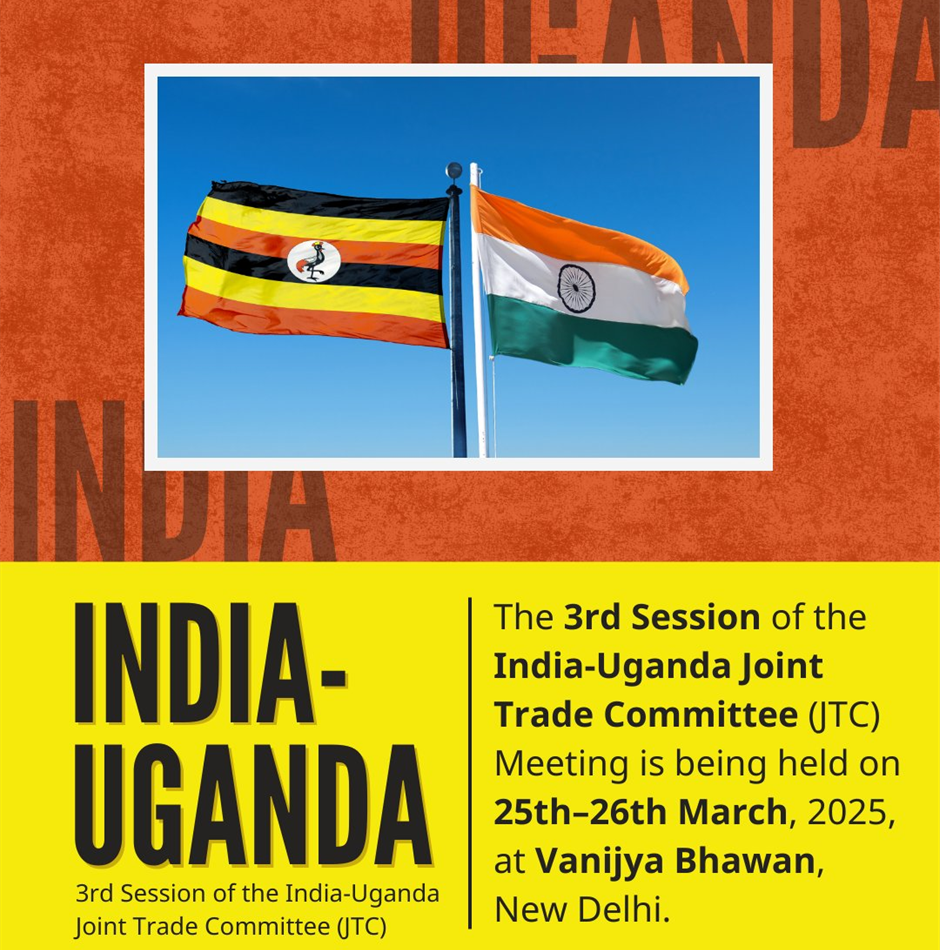Context:
The third session of the India-Uganda Joint Trade Committee (JTC) was held in New Delhi on March 25-26, 2025, marking a pivotal moment in the two nations' efforts to enhance economic collaboration after a 23-year hiatus. This meeting served as a platform for both countries to explore new avenues for cooperation, signifying their renewed commitment to strengthening trade relations.
Focus of the 3rd Session
The primary focus of the 3rd Session of the India-Uganda Joint Trade Committee (JTC) was to strengthen bilateral trade relations and explore new areas of economic collaboration.
Both nations discussed various sectors, including public works, agriculture, traditional medicine, telemedicine, and critical minerals, to boost cooperation and trade between India and Uganda.

Significance of the session:
This session was significant because it marked the first meeting in 23 years between the two countries at such a formal level. The discussions focused on enhancing, diversifying, and deepening bilateral trade and economic relations. Both countries recognized that the existing trade volume did not reflect their potential for economic cooperation.
Key areas identified for expanding bilateral trade
During the session, both sides identified the following key sectors for enhancing cooperation:
-
- Agriculture (including coffee, pulses, and spices)
- Minerals, including Rare Earth Elements (REE)
- Dairy products
- Cocoa products
- Essential oils and plastic raw materials
- Health and pharmaceuticals
- Electric vehicles
- Digital infrastructure and banking
- Mining and petrochemicals
- Agriculture (including coffee, pulses, and spices)
Key outcomes of the session
Some of the main outcomes of the 3rd JTC session included:
-
- A commitment to increase bilateral trade by focusing on key sectors like agriculture, mining, and healthcare.
- An agreement to form an India-Uganda Joint Business Forum to encourage collaboration between businesses from both countries.
- The proposal of multiple MoUs in sectors such as infrastructure development, agriculture, and healthcare, aimed at fostering long-term cooperation.
- A commitment to increase bilateral trade by focusing on key sectors like agriculture, mining, and healthcare.
About India- Uganda relationship:
India and Uganda established diplomatic relations in 1965. Both countries maintain a High Commission in each other's capitals, with India's High Commission in Kampala also accredited to Burundi.
Key sectors for India-Uganda cooperation:
-
- Trade & Commerce: Uganda exports minerals, coffee, spices, and other products, while India provides pharmaceuticals, machinery, and technology.
- Education & Technical Cooperation: India has been a destination for higher education for Ugandan students and offers training to Ugandan professionals.
- Health: Through initiatives like telemedicine and tele-education, India has supported Uganda's health sector, particularly in remote areas.
- Infrastructure: India is involved in setting up key institutions such as the India-Africa Institute of Foreign Trade and the Food Processing Business Incubation Centre in Uganda.
- Trade & Commerce: Uganda exports minerals, coffee, spices, and other products, while India provides pharmaceuticals, machinery, and technology.
Future opportunities
India and Uganda have identified numerous potential areas for collaboration, such as:
-
- Expanding trade in minerals, coffee, pulses, and dairy products.
- Strengthening collaboration in public works, infrastructure, and telemedicine.
- Exploring opportunities in agriculture, solar energy, and electric vehicles.
- Expanding trade in minerals, coffee, pulses, and dairy products.
Conclusion:
The meeting set the stage for a diversified and robust partnership, with clear goals in infrastructure, agriculture, digital technology, and sustainable energy. The strengthened India-Uganda collaboration will foster mutual growth and deepen their diplomatic and cultural ties.







